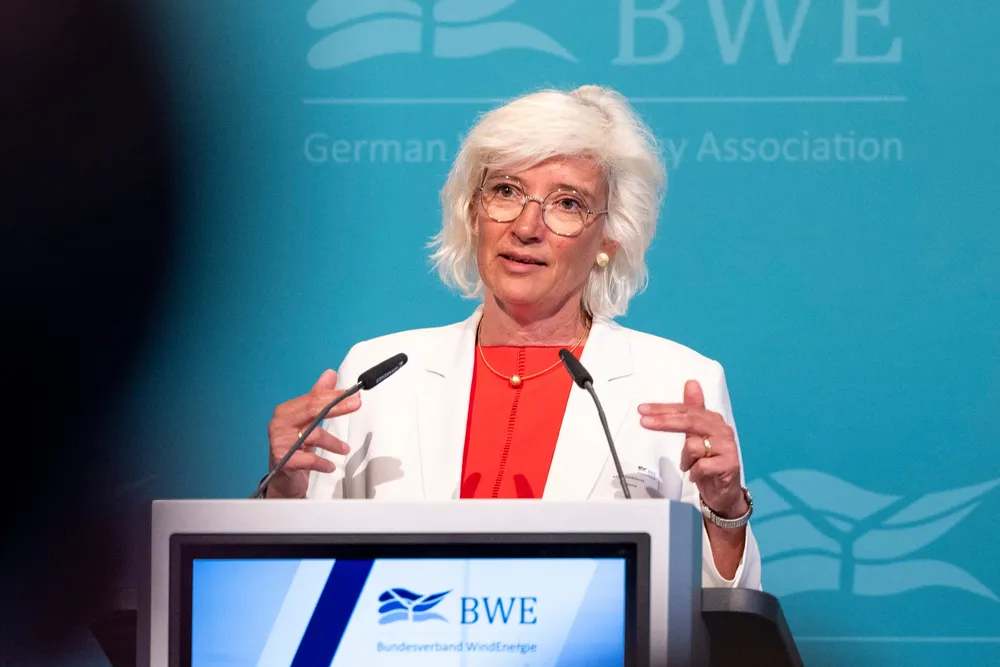Germany urged to take foot off 'debt-brake' to stay in green power fast lane
Green groups call for Merz to double down on energy transition with increased spending, but populist groups on the far right and left could stand in the way

Renewables and environmental groups have called upon new conservative German Chancellor Friedrich Merz to not just continue the Energiewende – Germany’s transition from nuclear and fossil to renewable energy – but to ramp up green spending.
However tricky budgetary constraints coupled with a blocking minority by populist right and left parties in the future parliament could impede that.
“To successfully de-fossilise the industry, we are dependent on wind and solar energy, and many politicians across party lines have understood this,” Heidebroek claimed.
“The energy system of tomorrow is renewable. The climate benefits from this, the economy benefits from it and in the end, we all benefit.
“As representatives of the most important energy source in the German electricity mix, we are ready to take responsibility and resolutely expand wind energy further. We expect the new government to continue consistently down this path.”
Germany last year met nearly 60% of its power needs with green power. Onshore and offshore wind accounted for the bulk of that, while solar also had a significant share.
Industry group WindEurope congratulated Merz on his election victory and pointed to 2024 being a record year in wind permitting and newly auctioned capacity.
"The country now has a strong pipeline of wind energy projects ready to come online. A broad majority of German policymakers and businesses acknowledge that a competitive and decarbonised German economy must be built around renewables," WindEurope said.
"And wind turbine technology helps boost German exports. Today wind energy employs more than 100,000 people in Germany.
"It is the most important source of electricity in Germany, providing 33% of all electricity consumed. The wind industry is ready to take on even more responsibility."
To continue with progressive pro-renewables policies, however, would require dozens of billions of euros in support of green power generation and the construction of backup power plants and battery systems for times of little wind or sun.
Debt-brake in way of more renewables spending
In an open letter, environmental group Greenpeace called upon Merz to stay the course in current climate policy, sticking to Germany’s goal to become carbon-neutral in 2045 – a target introduced by former CDU Chancellor Angela Merkel. It also called for the new Chancellor to stick to an EU-sanctioned phase out of combustion-engine cars by 2035, which Merz has said he wants to reverse.
Greenpeace also appealed to Merz to keep to an unpopular law pushed through by the Greens that aims at phasing out fossil sources for heating.
Greenpeace stressed wind and solar power are the backbone of the Energiewende and demanded more money for it as a result of upcoming coalition talks.
“More sustainable investments and a climate-neutral modernisation of the country can only be made possible by reforming the debt brake and fairly taxing very high assets through an ecological billionaire tax,” Greenpeace Germany managing director Martin Kaiser said in the open letter.
The so-called debt brake law enshrined in the constitution forbids the government to take on more than 0.35% of GDP per year in new debt, with exemptions only allowed for emergencies (such as the Covid-19 pandemic).
Merz’s likely coalition partner, the SPD, said during the election campaign that it wants to amend the debt-break rule to allow for more military spending and also to feed a future so-called ‘Germany Fund’ that would mobilise public and private capital to finance the upgrade of energy and other infrastructure.
Merz recently opened up to a rather limited amendment to the debt break rule, but if the next government really wanted to reform it, it would face major obstacles.
To amend the zero-deficit rule a two-thirds majority is needed in parliament, which the would-be future coalition lacks.
Even with the soon-to-be opposition Greens, the two-thirds cannot be reached in the new parliament, where the far-right Alternative for Germany (AfD) together with the radical Left party will hold a blocking minority (in regards to constitutional changes) of more than a third of seats.
To amend the debt break rule, Merz next to the Greens would thus also need the radical Left party, which is for abolishing it altogether, but has clearly said it won’t vote for any policies resulting in higher defence spending.
In a last-minute turn, the Greens on Monday suggested an amendment to the debt brake rule while the old parliament is still in place during the next four weeks.
Merz also said he wants to talk to the SPD today, but preliminary coalition talks are expected to start only next week due to another scheduled vote next Sunday, the election in the city-state of Hamburg. The election winner previously said he wants to form a new government before Easter.
(Copyright)